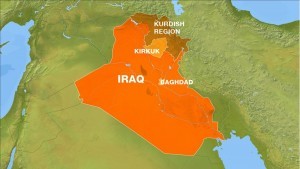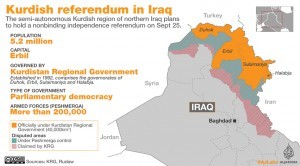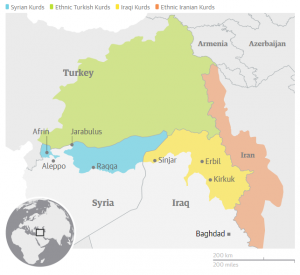People in Iraq’s autonomous region of Kurdistan are voting in an independence referendum, amid rising tensions and international opposition.
Polls opened at 05:00 GMT with balloting also taking place in the disputed areas between the northern city of Erbil and the capital Baghdad, as well as the oil-rich province of Kirkuk, which is ethnically mixed.
The central government in Baghdad, which strongly opposes the referendum, sought control of the region’s international border posts and airports on Sunday, in anticipation of Monday’s vote.
Iraq’s government has also called on foreign countries to stop importing oil from the Kurdish region and to deal with them instead.
In a televised address on Sunday, Iraq’s Prime Minister Haider al-Abadi warned of the dire consequences of the vote and vowed to never accept the disintegration of Iraq.
“This is an unconstitutional decision against the social fabric of our citizens. We will not recognise the referendum, nor its results,” Abadi said.
“We will take follow-up steps to protect the unity of the country and the interests of every citizen living in a unified Iraq.”
(Click to enlarge)
Meanwhile, the President of Iraq’s Kurdish regional government, Masoud Barzani, has defended the decision to hold the referendum.
“Is it a crime to ask people in Kurdistan to express in a democratic way what they want to have for the future?” he asked in a speech on Sunday.
The Kurdish leader also said he would seek talks with Iraq’s central government on how to implement the outcome of the vote.
“If we have a constructive dialogue, then we can give it even more time, in order to secure better relations between the Kurds and Baghdad,” he said.
Proud to cast my vote earlier this morning and partake in this historic day, the day of the #KurdistanReferendum pic.twitter.com/aDP16ZQiud
— Masoud Barzani (@masoud_barzani) September 25, 2017
About 2,065 polling stations are open for 10 hours. A total of 5.6 million people are eligible to vote in Kurdistan and other Kurdish-controlled areas in northern Iraq, according to the election commission.
Voters will be asked: “Do you want the Kurdistan region and Kurdish areas outside the region to become an independent state?”
Official results are expected by Tuesday.
Al Jazeera’s Hoda Abdel-Hamid, reporting from the Kurdish capital of Erbil, said despite the “tug of war” between the politicians, there is “an upbeat atmosphere”.
“The Kurds say that this is their time to express their opinion and to take their future into their own hands,” she said.
Opposition to vote
The Kurds are likely to approve the referendum, but the non-binding vote is not expected to result in any formal declaration of independence.
The referendum has raised alarm in Iraq’s neighbours – Turkey, Iran and Syria – over concerns it could encourage their own Kurdish minorities to break away.
Turkey is home to the largest Kurdish population at an estimated 14 million.
Turkish President Recep Tayyip Erdogan said on Monday that Ankara would close the Habur border crossing with northern Iraq over the plebiscite and also threatened the Iraqi Kurds with blocking their key oil exports.
“After this, let’s see through which channels the northern Iraqi regional government will send its oil, or where it will sell it,” Erdogan said in a speech at a forum in Istanbul.
“We have the tap. The moment we close the tap, then it’s done.”
Hundreds of thousands of barrels of oil a day flow through the pipeline in Turkey from the northern Iraq region.

Meanwhile, Iran closed its border with northern Iraq’s Kurdish region on Monday, the Foreign Ministry said.
“At the request of Iraq, we have closed the airspace and ground borders with the Kurdish Regional Government,” ministry spokesman Behram Qasimi said at a news conference in Tehran.
A day earlier, Iran halted flights to airports in Iraqi Kurdistan at the request of the central government in Baghdad, the semi-official Fars news agency reported.
Feisal al-Istrabadi, former Iraqi ambassador to the UN, said the Kurdish government risks throwing the region into turmoil for no clear gain.
“For the Turks and the Iranians, but particulary for Turkey, this [referendum] is an existential threat,” he told Al Jazeera, speaking from Bloomington, Indiana. “How Turkey will deal with an independently Iraqi Kurdistan, but deny their own Kurds independence is a problem requiring Solomonic wisdom.”
The United States and the United Nations have also condemned the referendum.
The UN has warned of the vote’s “potentially destabilising effect,” while the US has said it could fuel regional unrest and distract attention from ongoing campaigns to rout the Islamic State of Iraq and the Levant (ISIL, also known as ISIS) group in Iraq and Syria.
(Click to enlarge)
Source: aljazeera.com
Ask me anything
Explore related questions







